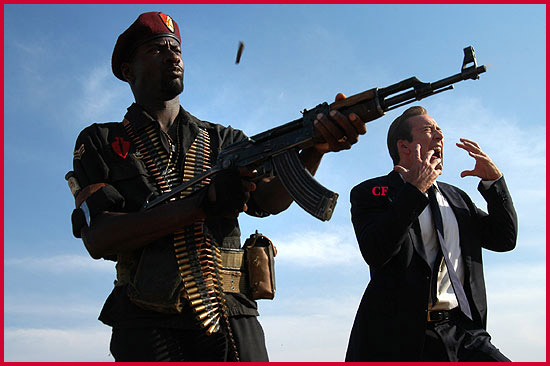
Maya Khankhoje is a movie-addict who shuns films about violence but sometimes feels compelled to see them anyway.
Lord of War. Feature film written and directed by Andrew Niccol.

Lord of War is definitely a film about how the local meets the ideological. Or rather, about how a bullet manufactured in the Minority World (aka The First World) ends its life and that of its target -in this case the skull of an African child- in the Majority World (aka The Third World).
In the opening scene, Yuri Orlov, the son of Ukrainian immigrants transplanted into Little Odessa (played with deadpan aplomb by Nicolas Cage) traces the life of a bullet from the factory to one of the many major conflicts that have raged in the world during his twenty years as a successful arms dealer. During this and other soliloquies by Orlov we learn everything we have never wanted to find out about violence, corruption and the essence of warfare. We learn, for example, that there is one firearm in circulation for every twelve people in the world and that illicit arms dealers such as our antihero will most probably never get caught because they are protected by the very governments whose dirty job they are performing. We are reminded that the five most important countries in the Security Council also happen to be the five biggest weapons manufacturers. We are also told what we already know: that the US President is the biggest arms dealer of them all.
Orlov’s nemesis is Jack Valentine (righteously played by Ethan Hawke), an Interpol agent who doggedly pursues Orlov throughout the years and changing geography, but cannot pin him down because of his strong belief in the rule of law. Other characters are a Ukrainian uncle who typifies the former Soviet official turned unabashed capitalist, a trophy wife who is in denial about the source of her opulent life-style, a kid brother who succumbs to an illicit weapon called cocaine and a dictator who benefits from all this. Ironically, this dictator happens to be the President of Liberia, an African country created to “liberate” Afro-American slaves.
The Lord of War would be a grim movie were it not for the stunning photography, a rich and humorous sound track and an excellent satirical script, all of which make it not only survivable, but thoroughly enjoyable.